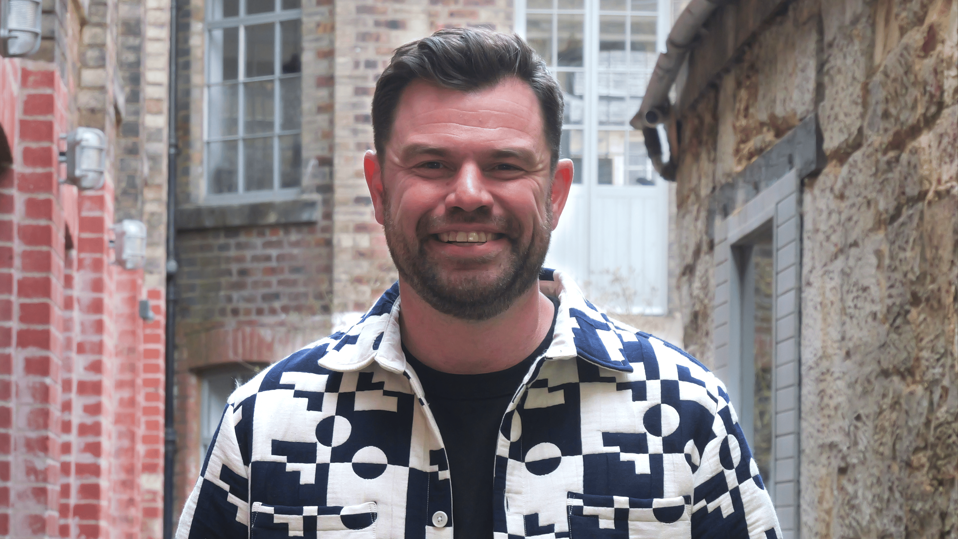Nick Sherrard, 42, is co-founder of Label Sessions, a creative consultancy that provides businesses looking to innovate with access to experts and creatives. The Edinburgh-based business was founded in 2023 and has worked with companies such as Meta, Google, Pepsico and Samsung. It hit sales of nearly £2 million in 2024.
In the early 2000s, Sherrard worked as an arts producer for ten years, producing plays and cabarets, including a stint with the National Centre for Circus Arts. From 2014 he worked at Market Gravity, a design consultancy that was acquired by Deloitte in 2017. He continued to work on innovation in Deloitte until 2020.
I learn to work with less
Through ten years of being an arts producer, you were always making things with incredible people, but very little resources. You’re very focused on how you can combine people into the right environment to do an exceptional thing. That was true, whether you were working on something in a performance context or more traditional theater.
You’re constantly trying to create precisely the right environment around precisely the right people to do something exceptional; find ways you can bring a project into the world and get an audience in front of it; and work out how you can corral or excite people around that thing.
There is a muscle memory I got from that experience, so when I started doing other things it came much more easily. I think, especially in the business world, people are so focused on managing through processes that they don’t necessarily look at how you can corral people around a particular thing.
The circus taught me the extremes of people management
Circus is a classic area where it’s very precise about who the people are that you bring together, more precisely than any of the other art forms.
When you’re close to circus training, outside the clowns, on the physical circus side, you have duos and teams that have to be together for very long periods of time. You can only do some of the things they do with the relationships that they have and the precise training that they have.
Aerial in particular, that’s where the whole performance is based on the trust they have in each other, doing a very particular thing, building on a very particular practice, so it’s not quite the same as a theatre production where you can just switch the cast at various times through the year.
It’s an extreme environment for managing creative people. Nothing in that area is done purely because someone thinks it’s a smart thing to make a fast buck. Everyone’s doing it because there’s some reason why they are obsessed.
In those settings, people need to focus on the thing that they’re doing, and know that you’ve got the rest, which I think is also quite different from business culture.
I learnt a lot from the consulting world
I must be the only person to ever run away from the circus to join Deloitte.
Big businesses have looked at [the creative process] as, “Hey, let’s make sure all of our people are trained up in that.” So they know how to do a day plan and know how to facilitate the workshops and what things should look like at different steps. It makes it quite repeatable.
Within big consulting, people even then talk about people being fungible. So actually, if everybody’s got the same training in the same processes, then it shouldn’t really matter who you put on it to get a result. To a certain extent, that works, you will get a result.
The nonsense becomes really clear as soon as you take it out of a big business context. If you wanted to create a hit record next year, the idea that someone just talks you through the process of doing it gets a bit ridiculous.
Helping to create great ideas
One of the biggest banks in the world was asking recently about “green” finance. They’ve all made big commitments to “green” their [lending] book, or to reduce the environmental impact of the mortgages that they sell. To do that they need to convince people to make green changes to their homes at the same time as they buy a house.
Within that setting, we drew together people who were leaders and had designed new propositions within banking, internationally. We also had founders who had been through the hard yards of building green brands, sometimes in other industries like fashion, but had real insight into how you can motivate people.
Then, when it came to working out how to communicate, that’s where we had to use the creative roster in different ways. Any team you put together tends to have a core of people who’ve been there and done that on the problem itself, but then people who look at it from a different angle.
We made everyone a producer
At Label Sessions, we don’t have project managers, we have producers. We explicitly train them as producers and get them to look at producers in the arts world as their model.
If you’re trying to channel people to do pioneering and innovative stuff, you will be dealing with characters who are “difficult”, but actually, they’re quite often difficult because they’re obsessing over something to a level above and beyond what anybody else would do.
Nick Sherrard was talking to Niamh Curran, reporter at the Times Entrepreneurs Network

